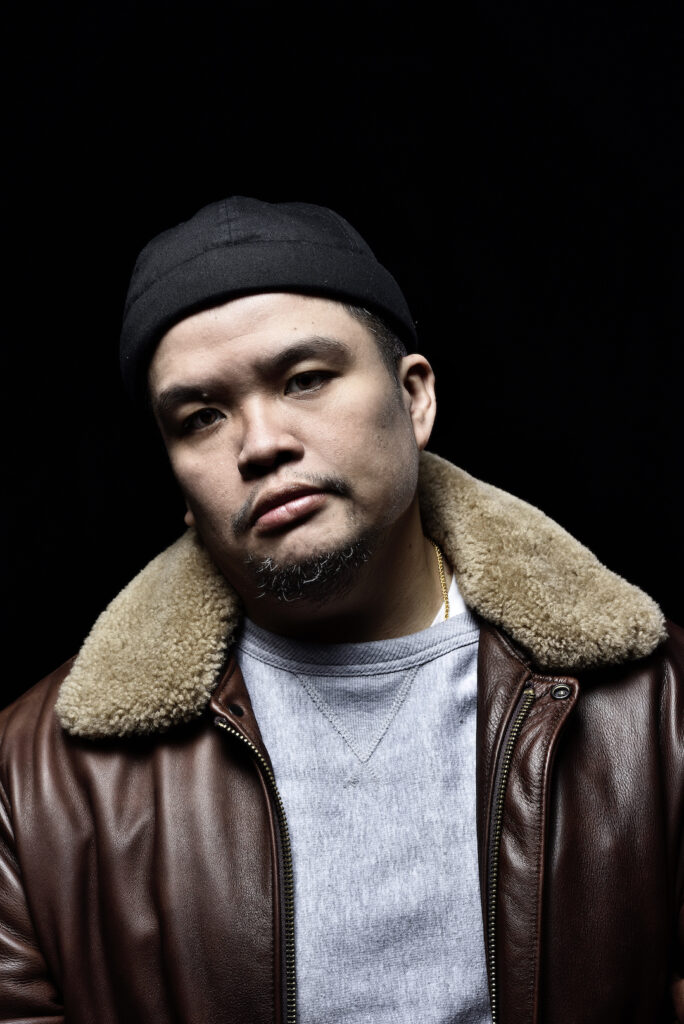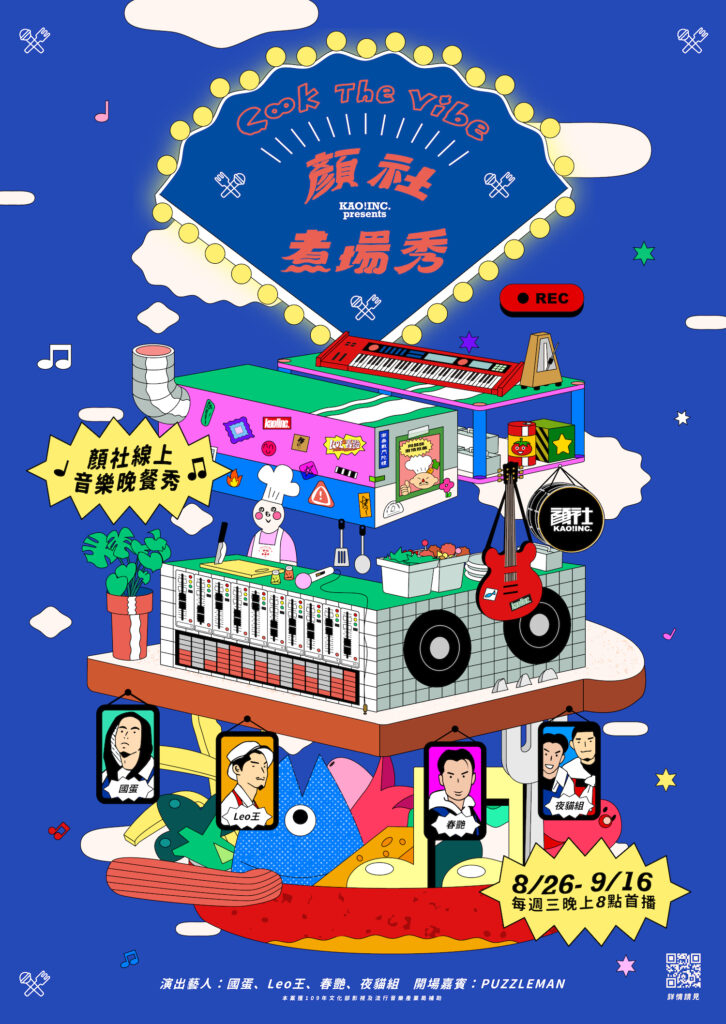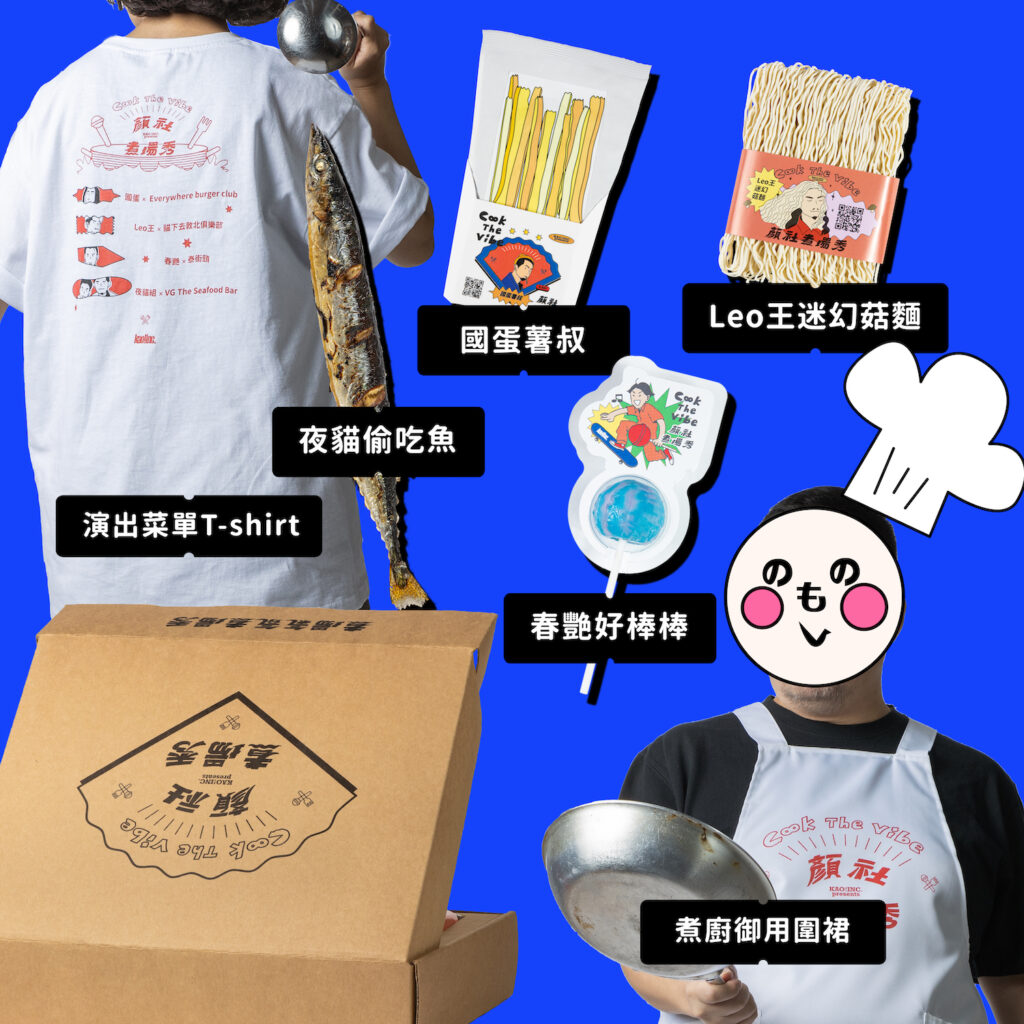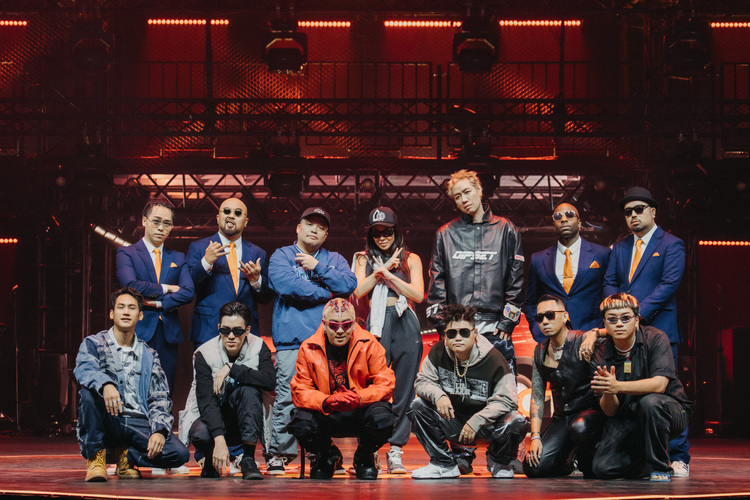Taiwan's first musical experiment in paid livestreaming kicked off with hip-hop duo Yeemao squeezed into a kitchen with a band dressed as chefs. Leo Wang and Chunyan rapped in a Taipei seafood restaurant, surrounded by plates, chopping boards, and fish on ice. At home, fans tucked into a vacuum-packed fish and French fry potato chips that had been delivered in a food box with their ticket – and, in some cases, aprons.
The "Cook the Vibe" show produced by KAO!INC., one of Taiwan's biggest hip hop labels, is the first of four that are costing fans up to 2,299 NTD (US$78) to stream. The label wants to offer fans something humorous and fresh – apart from the food. It is also experimenting with a new business model, convincing fans to pay for a virtual experience by offering them something they can hold in their hands, like a vinyl record. In this case, they get a pizza-style box containing quirky food, and an optional t-shirt and apron. A physical box "is not a hard sell," said Dela Chang, founder of the KAO!INC. label.
"I believe directly selling virtual tickets won't work in Taiwan," he said. "There isn't this custom, and there is no way of replacing live gigs. Secondly, Taiwan is very small." If you live in China, Japan or the U.S. and want to see a local band, you probably have to travel a fair distance and spend money on accommodation. "But in Taiwan it's really easy to see gigs live," said Chang.

KAO!INC. founder Dela Chang.
Livestreaming has become the new way of doing business in the Covid-19 era. However, unlike most of the world, bands and solo artists in Taiwan don't have to resort to livestreaming. The East Asian nation has won international praise for its successful control of Covid, registering fewer than 500 cases to date.
In Taiwan, social distancing measures were in place for just a few weeks, with concerts cancelled because of restrictions on audience numbers. During that time, Taiwanese rock band Mayday livestreamed a concert from an empty stadium. Large-scale live shows came back with a bang in August when Mandopop star Eric Chou performed at two sold-out concerts in Taipei Arena. Around 10,000 mask-clad fans attended each one.
But around the world, the cancelling of music concerts to stem the spread of Covid is likely to continue. In the early days of lockdowns, many musicians livestreamed for free on Facebook Live and Instagram, singing in their homes and sometimes asking fans to donate money to charities and health workers on the virus frontlines. Since then, artists and promoters have found new ways of generating money online, such as paid subscription-only accounts that give fans behind-the-scenes footage and other exclusive content. These formats have also allowed artists to nurture more personal relationships with fans.
Concerts – the bread and butter of the music industry – have transformed for the Covid age. When Korean boy band BTS's world tour was cancelled, they held a virtual concert to mark their seventh anniversary. It was a huge success, attracting 756,600 paying fans and reportedly pulling in almost $20 million in ticket sales. In Britain, musicians are holding concerts with audiences penned off in groups of up to five people. In the first one in Newcastle last month (AUG), Sam Fender played to a crowd of 2,500 in a space that normally holds 20,000. Indonesia has held several drive-in concerts. One by 90s pop group Kahitna drew hundreds of cars with passengers told to stay inside. It remains to be seen whether smaller audiences and livestreaming can replace enough lost revenue from touring to keep the industry and artists afloat.
Yet before Covid-19 hit and changed the music industry, KAO!INC.'s Chang was already planning Taiwan's first paid live-streamed gigs. He was inspired by watching jamming sessions like Tiny Desk, hosted in the NPR Music office, and those recorded and published by Chicago-based label Audiotree.
"I thought if I do this kind of jamming session it needs to have something special, so everyone knows as soon as they see it that this is ours," said Chang in an interview in his mixing studio, which sits in the back of KAO!INC.'s own café. "I thought what kind of atmosphere do I like?" said Chang. "I like to cook, I like to watch all kinds of videos, like Anthony Bourdain, I like the way he tells stories in the kitchen."
Chang said when "a band practices in a small space, like in a recording studio or a rehearsal room, it's like they are cooking up a vibe, not only playing music. I think a restaurant kitchen is a little like that, they don't just make food… they also create an atmosphere."
From there, the "Cook the Vibe" idea was born. Its shows are 40-minute sets pre-recorded in the kitchens of well-known Taipei restaurants, followed by a 20-minute live party in KAO!INC.'s café with invited guests.

The shows are streamed on Vimeo each Wednesday evening until mid-September. They feature rappers Leo Wang, Chunyan, GorDoN, and Yeemao – the Leo Wang and Chunyan duo. Leo is the first hip-hop artist to win Best Male Mandarin Vocalist at Taiwan's Golden Melody Awards, the Chinese-language equivalent of the Grammys.
KAO!INC. say they are the first to charge for a live-streamed music show in Taiwan, but are refusing "to give up" from the outset and make it free. Chang thinks the key ingredient is humor.
For 999 NTD (US$34), fans are sent a large cardboard box with a QR code ticket for the four shows along with items the label hopes will amuse them. Inside the box are yellow instant noodles – resembling a past hairstyle of Leo's; a skateboard-themed lollypop in honor of skateboarding-mad Chunyan; French fry potato sticks for GorDoN, who studied in the U.S.; and a grilled fish because of Yeemao's Chinese name, which translates as "Evening Cats Group." For 2,299 NTD (US$78) fans can get a deluxe box set package, which also includes a t-shirt and apron. A third option is a 300 NTD (US$10) ticket for access to one show only. These go on sale 24 hours in advance to give that "walk-in" feeling, and allow fans outside of Taiwan to tune in.

"Cook the Vibe" has been filmed and edited to make viewers feel as if they are a fly-on-the-wall – somewhere in between a polished music video and a jamming session where a band plays to an audience. In the backstage of the restaurant – otherwise known as the kitchen – Yeemao opened the first show with "Blue Cheese," a rap about the modern peril of being without a mobile phone. The pair faced each other as they rapped and moved to the beat, Chunyan perched on a countertop next to a watermelon. Leo wore red heart-shaped sunglasses and alternated between holding a tomato and a banana. The screen flashed to electric guitarists, a keyboard player, and a drummer beside the sink with an overturned pan on one of his cymbals.
"I think it's a great idea," said Bangkok-based artist manager Andy Griffin. "(Rappers don't normally have) a band – you haven't got the bass, drum, guitar, visually it's not quite as appealing as seeing a live rock band jumping around. You have to do something different and get people's attention," he said.
"It's appealing to the fan base, there's something tangible – you can eat the food – and there's opportunity for cross-branding and cross-sponsorship with the restaurants," Griffin added.
After the pre-recorded set, the action shifted to an after-party in KAO!INC.'s offices, with Yeemao, Chang wearing an apron, and fans who won a ticket lottery. Around 450 people watched live.
On Monday, almost a week after the first show, Chang said he had sold more than 1,000 boxes and walk-in tickets. Some of the roughly 100 single-show tickets were bought by viewers in Hong Kong and the United States. Chang said that even if he sold all 2,000 boxes he wouldn't make any money this time around. He will take on board feedback, and also learn from anyone who takes his idea and "comes up with something cooler."
"Doing this session isn't about replacing live gigs, it's about giving people today another way of watching shows," said the KAO!INC. boss. "If you go to watch a concert with more than 1,000 people, unless you're right at the front you won't see anything, and the sound isn't necessarily so good."
"But watching these sessions at home you can be at your most comfortable, wear your best headphones and see everything clearly."


























